
Enable Your Mental Health Secure Escort team to Keep Everyone Safe
We bring skills to Mental Health Secure Transport teams who look after vulnerable - sometimes unpredictable - people in their work.
Dynamis training for Mental Health Secure Transport teams gives you the peace of mind that your teams are able to:
At Dynamis we provide evidence-based and scenario-driven conflict management training through the whole spectrum of conflict, enabling Mental Health Secure Transport teams with the skills and knowledge they need to professionally respond to any level of conflict.
AUDIO INTRODUCTION: Listen as our Director of Training introduces our Secure Mental Health Transport training.
This is what we do
Non-Escalation
Wouldn't it be better if we could avoid escalating these situations in the first place?
De-Escalation
Tried and trusted pathways for managing people who are abusive, refusing or resistant.
Crisis Intervention
Using empathy as a guide to create safety and to aid recovery for people who are in emotional distress.
Last-Resort Physical Response
A system of physical alternatives which may be required if we can not create safety any other way.
Make your workplace a safer environment for everyone who meets there.
Our wide range of courses are designed for public-facing teams who deal with vulnerable individuals and those capable of spontaneous aggression. Our aim is that every person is treated with dignity and is shown respect, even when there is disagreement.
Book a tailored training course from Dynamis Training and your team will:
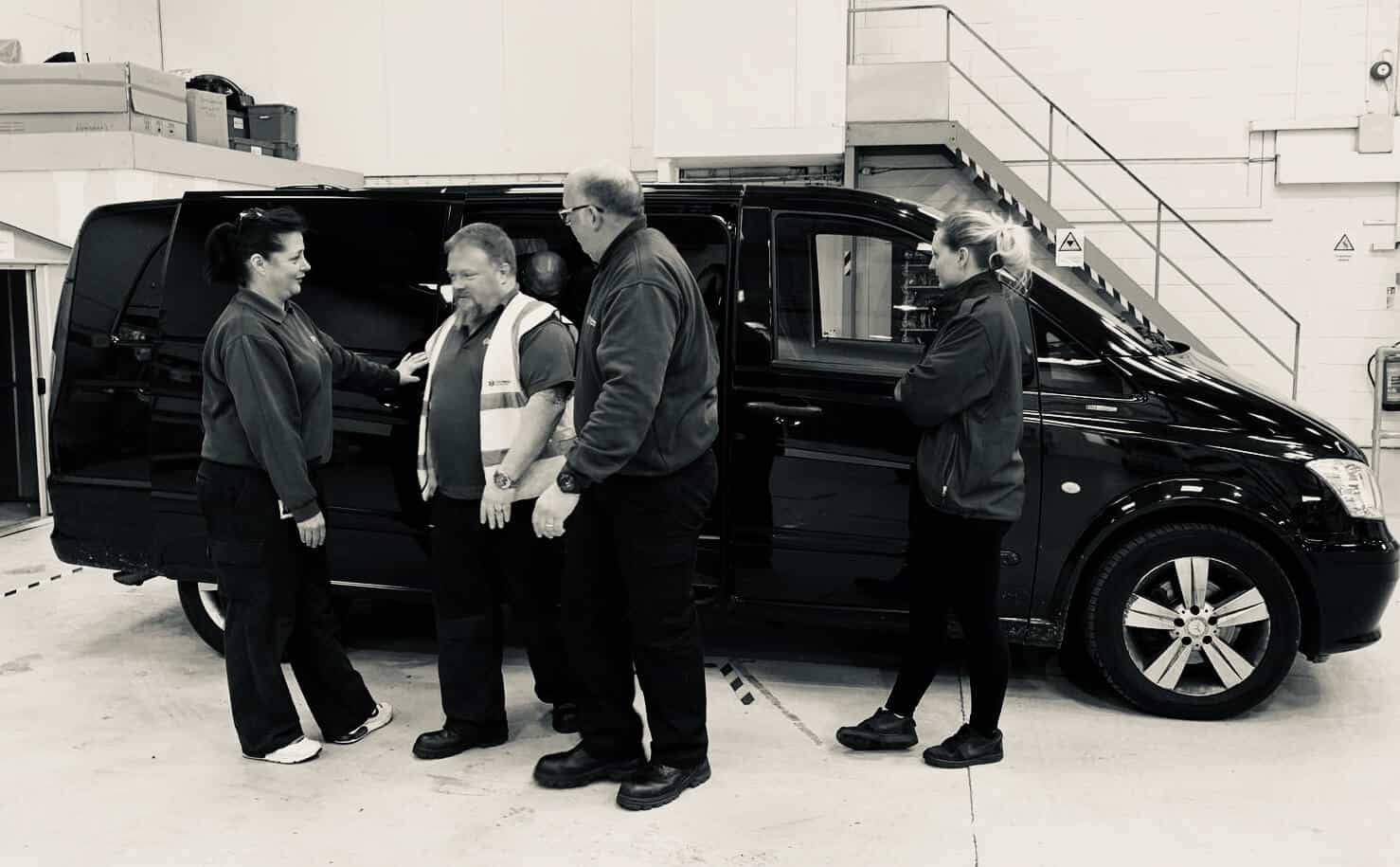
Mental Health Secure Transport staff are frequently exposed to the risk of aggression and violence because of the nature of the work. Taskings often require Secure Escort teams to encounter vulnerable people who may be distressed or agitated because of poor mental health or are suffering from the effects of drugs and alcohol intoxication. Developing effective habits and attitudes for maintaining situation awareness and personal safety in such Secure Escort situations is a critical area for staff both new to the job and veterans. Our '9 Attitudes' methodology provides a framework for developing these skills and our conflict resolution program helps to ensure that Contacts with vulnerable people in the community are both non-escalatory and effective.
Where Mental Health Secure Transport personnel are confronted with acts of physical violence, the use of protective physical interventions may become necessary and therefore it is prudent for services to provide training and skills for disengagement and breakaway for personnel. Our system of self protection offers, in a short period of time, skills which are instinctive, easy to learn, are retained well over time and which are extremely effective in helping Secure Escort staff to prevent themselves being injured in the result of physical attack. Because the methods we use are based on protective instincts, they are very court defensible and appropriate for use by healthcare staff.
There are times in some Mental Health Secure Transport tasks - when words alone fail to create safety - the use of force to control or restraint a patient becomes necessary. These situations may arise when Mental Health Secure Transport staff are attempting to prevent harm from occurring, when a patient is refusing treatment or refusing to attend hospital at a time when they are judged not to have capacity or autonomy to make these decisions, for example. In these limited scenarios the skilful application of control tactics and physical interventions, while working as part of the Secure Escort team, can reduce the risk of potential harm to the patient and increase the overall safety of the attending personnel.
Where the Mental Health Secure Transport service is engaging in an escort task, often it will be necessary for the Escort team to have a full understanding and knowledge of the control and restraint tactics which may be appropriate to safely complete the transport of a patient. This sometimes will include the use of holding techniques and procedures which reduce the risk of the patient absconding from the care custody and control of the team with whom they have been placed. Secure Transport staff may need to have a high level competency in these tactics in order to safely carry out their taskings.
For some high secure patients it will be necessary for escort staff to safely apply restraint devices. Training should ensure that any application of restraint devices is both safe and appropriate and effective, proportionate to the needs identified in the escorting procedure. For example, handcuff training should include elements of the proper care of the devices, the mechanical principles which underline their use, the legal rules which accompany their use and tactics for use with both compliant subjects and non-compliant subjects.
FUNDAMENTALS OF BEHAVIOUR FOR PEOPLE WITH SPECIAL NEEDS (Mental Health and Dementia focus): Where the Mental Health Secure Transport staff do not have clinical level of understanding about the special needs of those they may interact with during transfers, it is imperative that the initial and ongoing training in the Prevention and Management of Violence and Aggression should offer a baseline level of advice to staff. It has been identified that secure escort staff sometimes meet service users with Demential, Learning Disabilities, varied Mental Health conditions, intoxication/drug use and, in the most challenging circumstances, a mixture of these. Staff need to have a common language for describing the behaviour that they are seeing and experiencing, so that there is a foundation of understanding from which good decision-making can emerge. Staff should be given an insight into the essential characteristics of the conditions along with conflict non-escalation, de-escalation and crisis management strategies for effective communication with people who display the behaviours in question.
THE STATUTORY DUTY OF REASONABLE CARE: Mental Health Secure Transport team members need to understand their duty of care in any scenario which may carry a risk of injury. Section 7 of the Health and Safety at Work Act 1974, which specifically addresses the duty of employees, provides the basis of our advice in this respect. The Act requires employees to take reasonable care for themselves and for others who may be effected by their acts or omissions. The training will endeavour to make sure that staff understand the need to balance their own safety (as a primary consideration) with the need to take action which also creates safety for the Patient (the secondary consideration).
NATIONAL-LEVEL GUIDANCE for PHYSICAL INTERVENTIONS WITH Patients: Mental Health Secure Transport staff will need to have an understanding of the national-level guidance and good practice advice in relation to physical interventions and use of force with Patients. (NICE Guidance NG10) and the Mental Health Code of Practice.
THE STATUTORY POWER TO USE REASONABLE FORCE: The legal basis for any physical intervention with a Patient in an Mental Health Secure Transport setting is currently laid down in the Common Law, the Criminal Law Act 1967, the Mental Health Act and the Mental Capacity Act among other places, which grants staff the power to use ‘such force as is reasonable in the circumstances’ with vulnerable persons, in the pursuit of certain lawful purposes. Staff who carry out physical interventions will need to make robust decisions about the use of force during often rapidly-unfolding or high-stress incidents. They will also need to articulate their decisions post-incident in written reports and debriefing by their line management and/or any investigating authority. Clear principles which establish the foundation of the use of Reasonable Force will be explored by the staff, specifically the key components of Necessity and Proportionality as they relate to those decisions. Key issues will include the ambiguity of circumstances, perception and justification.
AWARENESS OF RISK IN PHYSICAL INTERVENTIONS: Through long and sometimes tragic experience, there is a considerable body of knowledge and accepted advice in regard to the management of risk in physical interventions. The most critical risk is that a person subjected to a physical intervention would succumb to a sudden, restraint-related death. The risk factors which increase the possibility of a sudden, restraint-related fatality are well known and will be explored with staff so that they understand the types of physical intervention which should be AVOIDED whenever possible in Mental Health Secure Transport work. They will also explore the warning signs which would alert them to the possibility that the risk of fatality is presented in a scenario and the alternative measures they should take if such a scenario should present itself. key issues will include the difference between emergency interventions and planned interventions and the need to be aware of manual handling regulations/advice to avoid musculoskeletal injury where possible.
OPTIONAL:
THE USE OF RESTRAINT DEVICES AS A LESS-INTRUSIVE RESPONSE Systems of soft restraint are now in use throughout the UK which offer alternatives to the traditional metal handcuffs and prolonged, intrusive manual restraint by staff. Soft-restraint systems are a direct replacement for metal handcuffs and have been medically reviewed, legally tested in court as a “less intrusive” method of restraint and offer a risk-reduction strategy for staff, organisations and for the patient. Where properly incorporated into the system of work for the Mental Health Secure Transport staff, soft-cuffs have the potential to significantly increase the safety of the staff in some of the most difficult situations they face.
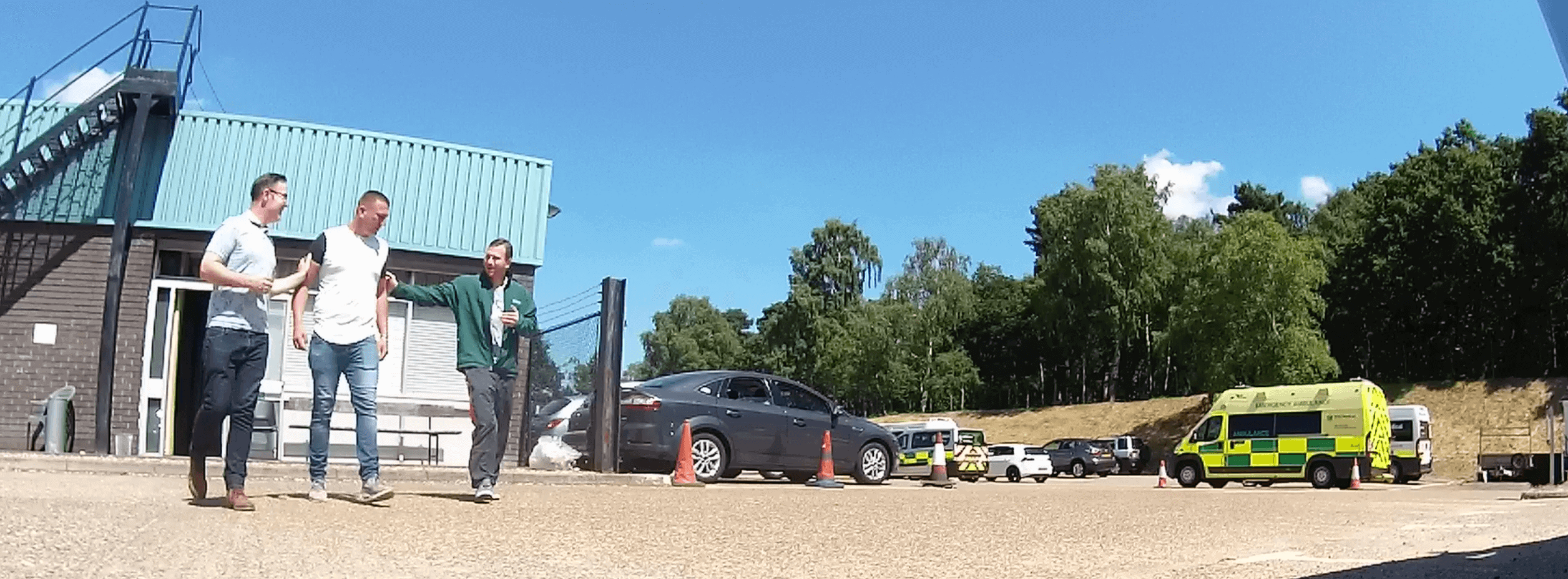
Hundreds of safer clients...








FEEDBACK ON MENTAL HEALTH SECURE TRANSPORT TRAINING:
“Exceeded all the criteria we needed to achieve, interesting, interactive, informative and enjoyable. A really impressive course in all aspects, my team came away visibly more confident and closer as a team, I am certain the experience will give us the right foundations enabling excellent care to the patients we manage. A sincere thanks.”
"I have been on many training courses and this has to be the best one I have been on and I believe that it was down to the amazing trainer. He understood our needs and situations we could get in to and then used these to practice and learn different techniques. He took his time with each member of staff and treated us as individuals and as a team."
“Overall the course was well presented. Made a welcoming change to focus on patient role play and de escalation techniques! Really found the hands on part of the course very useful compared to other companies techniques. Very good course.”
Our Process for Working with You
HI! I'M GERARD O'DEA
Director Of Training At Dynamis
Hi and thanks for visiting our website today.
In over 15 years of working with frontline staff who face difficult, distressed and dangerous behaviour, i have seen time and again how prepared staff can perform well and respond to challenging circumstances.
From teachers to nurses, teaching and care assistants to security officers in our hospitals and social workers in the community, if you deal with people every day, managing conflict becomes a necessity.
I became involved in this work because i saw the power of training and preparation in helping people to stay safe at work and to be more successful in working with their colleagues to create better outcomes.
I and my team of professional trainers now teach in over 200 training engagements every year around the uk and internationally for a wide variety of public-facing organizations just like yours.
We have sought out the best conflict management training content and the best learning methods in the world and bring them together for you and your team.

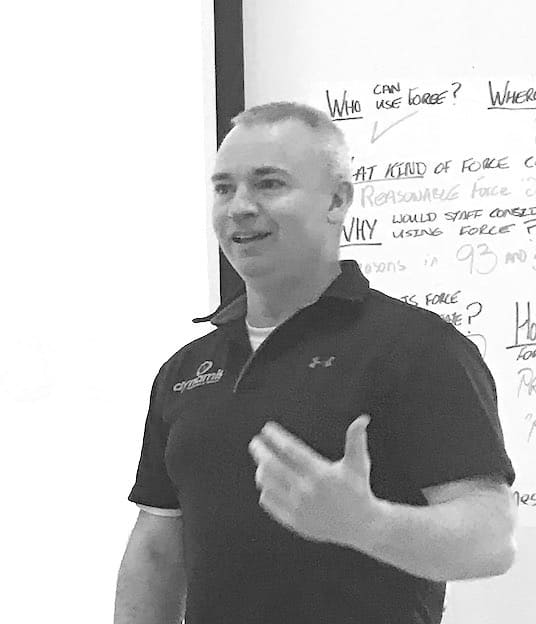
Our Courses and What they Cover
Join Over 3,000 Happy Customers
What our customers are saying:
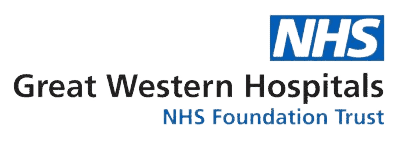
Best Course I have attended in the NHS...
“This was by far the best course I’ve attended in the NHS. Fit for purpose, current, relevant and extremely well delivered. 10/10 for delivery, professionalism and structure.”
ANDY W. // Security Management Specialist
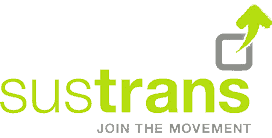
Made it Relevant...
“Very good training, and great effort to make it relevant for the type of conflict and situation we face. Excellent Trainer – 10//10”
MICHAELA G. // Community Engagement Officer
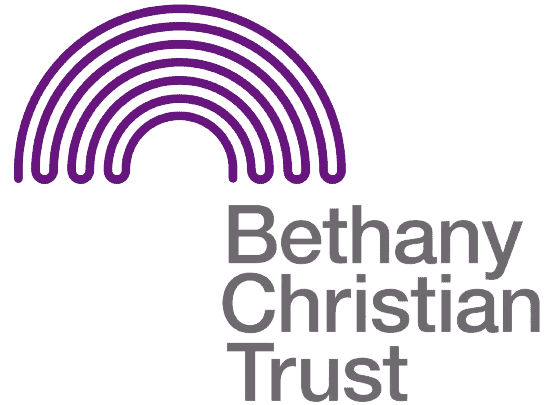
Tailored to situations we actually face...
“Gerard was a great teacher, he was very knowledgeable and friendly. He tailored the training to situations we might actually find ourselves in which I found incredibly useful.”
Louise C. // Homeless Shelter Support Worker

Confident...
I left feeling confident that I could safely apply the techniques I had been shown and know when to use them. Since completing this training another member of staff and I who where both on the course have been able to safely escort a child, whom we have previously struggled and felt unsure/ unsafe with escorting when dis-regulated back in to the school building safety. We were both on the same page as were the other members of staff who witnessed the incident (and were also present for the training that day) and this greatly helped us to safely bring the child back in to school. I would like to once again give my thanks to the team who came in to teach us that day. They were both amazing!
Classroom Teacher // Blossom House School March 2020.
With over 15 years of experience working with clients, we are confident that we can gain an understanding of your issues, resources, timeframes and budget quickly and soon propose a training plan which fits your needs.
Dignity and Respect in Mental Health Secure Transport
We help contact professionals to manage difficult, distressed or dangerous people in their workplace in the most effective and professional way possible, to keep everyone safe, verbally if we can, and physically only if we must.
Our core value as a business is that everyone should be able to work and interact with services in the world while retaining their dignity and being treated with respect, even in circumstances which are difficult. We train your staff to create safety from chaos.
Our Partners and Accreditation
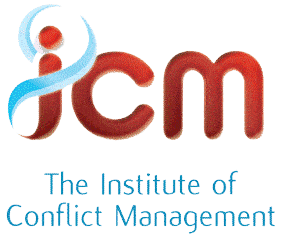
MEMBER OF THE INSTITUTE OF
CONFLICT MANAGEMENT
Dynamis is a Quality Award Centre with the ICM, a recognised accrediting body in the U.K. for workplace training in the prevention and management of workplace violence.

EUROPEAN PARTNER FOR
Dynamis is the premier European Partner for Vistelar, a global consulting organisation covering training across the entire spectrum of human conflict.
REGIONAL REPRESENTATIVE FOR 9 ATTITUDES BEHAVIOURAL TACTICS
Dynamis represents the 9 Attitudes system, a fully behavioural approach to self-protection and physical control which is based on the observable realities of physical confrontation.
Frequently Asked Questions
Usually the training venue will be our client's responsibility and full details of this are made clear around the time of booking so that you know what we are going to need to give your people the best possible experience of training with our team.
We have often helped our clients to source appropriate training venues, where that assistance was requested!
Due to the nature of our training approach, we often require a good-sized training room which has the capacity for your team to move around in and in which we can set up scenarios which are as close as we can get them to real-world applications of the material we teach your people.
Our training costs are often calculated on a per-day basis and directly related to the Needs Analysis which we carry out with you.
We are constantly working to make sure that the investment level is reasonable and competitive.
We generally ask for an investment which takes into account the type of content we are going to work on with your staff, the numbers of staff involved, the risk level of the encounters they engage in and the number of days of training which will be required to get your people up to the proper standard.
We are VAT registered and all pricing sent to you is 'plus VAT at the prevailing rate'.
We also charge travel expenses which you should discuss with our training advisor so that these are as clear as possible as you book in your training course.
Our training advisor is waiting to have a call with you to discuss your timelines and preferred schedule. We generally book training 4-6 weeks out from today, however we always have been able to respond to clients who need training 'as soon as possible' when urgent needs pop up. The sooner we talk with you, the sooner we can get the training in place!
There are numerous formats which we use to deliver training with your team, whether it be a large group or a smaller team. We know that the best group sizes for learning depend on the complexity of the material to be covered, the amount of time we have with your people and also the constraints you may be working with in your budget and resources. Most of our clients put 12-16 people in our less-physically demanding training courses, and often fewer people than this into our more demanding courses. Let's talk about the best solution for your needs....
Dynamis has attained the respected Quality Award Centre status (QAC #2201) with the Institute for Conflict Management (ICM), demonstrating our commitment to quality assurance and strict adherence to the most recent guidance on the management and prevention of workplace conflict. All our trainers are fully qualified and attend CPD development on a regular basis in accordance with ICM requirements.
Our goal is that you see a tremendous improvement in your team's ability to prevent and manage difficult encounters with the people in your service, so we focus on making sure that each training session with your people feels directly connected to their everyday work and is compliant with the relevant guidance which governs it.
100%
You are fully protected by our 100% Satisfaction-Guarantee. If you are not fully satisfied by the training we deliver for your team, just let us know and we'll send you a prompt refund.
Gerard O'Dea